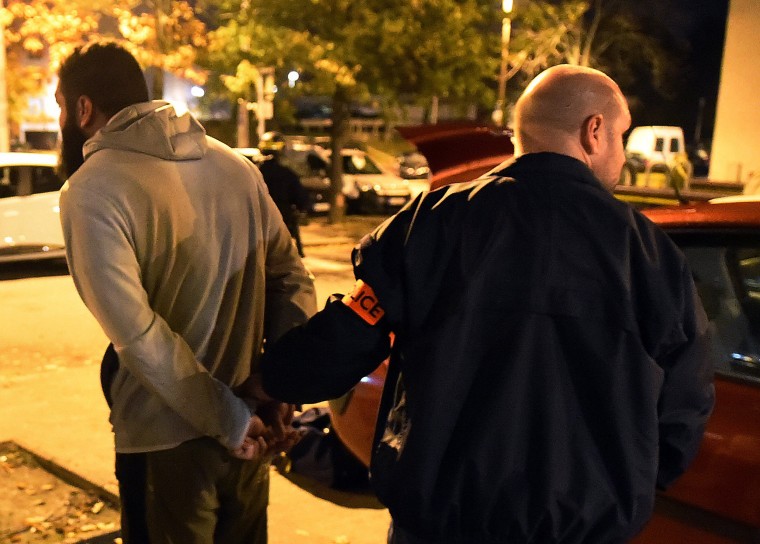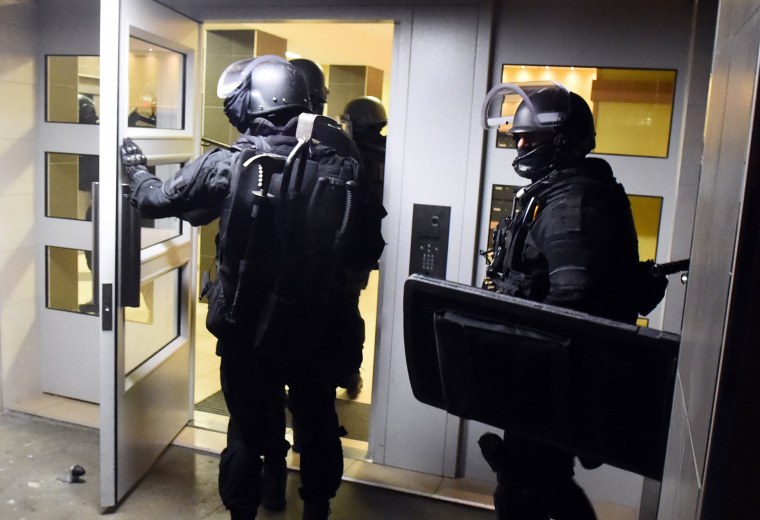PARIS — French police launched dozens of raids overnight as part of a colossal manhunt following the deadly terrorist attacks in Paris.
Prime Minister Manuel Valls told the RTL radio more than 150 raids were carried out across the country.

"We are at war with terrorism," he told the station. "The terrorists can strike again."
Interior Minister Bernard Cazeneuve said that 23 people had been arrested — while 104 others detained for questioning — over a 48-hour period. He added that guns, bulletproof vests and even a rocket launcher had been seized.
"This is just the beginning," Cazeneuve said. "The response of France will be total. Those who attack France, we will catch them and we will be unrelenting with them ... Terrorists will never destroy the Republic, because the Republic will destroy them."
A total of 168 raids took place throughout the country, including some in the cities of Toulouse, Grenoble, Bobigny and Lyon.
They came amid a broadening investigation that has stretched across Europe to find any potential accomplices to the bloody attacks which rocked Paris on Friday.
Three teams of terrorists laid siege to Paris on Friday night, killing 129 people in a spree of shootings and explosions across six locations. The attackers were all outfitted with suicide vests and armed with Kalashnikovs.
French President Francois Hollande called the attacks — which ISIS claimed responsibility for — an “act of war” and on Sunday night launched airstrikes on the terror group’s de facto capital of Raqqa, Syria.
Hollande also asked the country's parliament to extend the state of emergency for a three-month period and announced plans for 5,000 new police and military posts to be created in the next two years.
In an address to France's Congress, Hollande warned that jihadist terror "threatens the entire world."
Authorities also expanded a massive manhunt for any potential accomplices — with one Salah Abdeslam in the crosshairs.
An arrest warrant described the 26-year-old him as “dangerous” and potentially linked to the attacks. NBC News learned that Abdeslam signed the rental car papers for one of the cars used by the attackers.
One of his brothers is reportedly among the dead attackers.
French authorities released more information on two of the other terrorists on Monday.

An attacker at the Bataclan concert hall was identified as Paris-born Samy Amimour, 28. According to the Paris prosecutor, he became known to anti-terrorism police after trying to travel to Yemen. An international arrest warrant was issued for him after he apparently breached a court order in autumn 2013.
Officials said one of the suicide bombers at the Stade de France was carrying a Syrian passport in the name of Ahmad Almohammad, 25, but it was not immediately clear whether the document was authentic and if that was the terrorist's real identity.
Greek authorities say that attacker arrived in Europe on a migrant boat last month. He was tied to the Stade de France stadium bombings by fingerprints which match those taken by authorities in Lefos, Greece, who met a boat from Turkey on October 3. However, French officials believe the passport may not have been genuine.
Earlier, NBC News confirmed that one of the attackers who died Friday was 29-year-old Omar Ismael Mostefai, who was identified by a severed finger found in the music venue.
The hunt for other suspects has stretched across Europe. French police are working with authorities in Serbia, Germany, Spain and Belgium — where a series of arrests have already been made.
Belgium is of particular focus in the international investigation. French prosecutors, without giving the names, said two other people from Belgium were among the dead attackers: a 20-year-old in the Stade de France strike and a 31-year-old in an attack on a restaurant. Both were French nationals living in Belgium.
Several arrests were made in Molenbeek, a poor quarter of Brussels that is home to many immigrants. Raids were also reported there on Monday morning, with police seen detaining at least one individual.
Belgian Prime Minister Charles Michel declared his nation was no place for "preachers of hatred." He added that Belgium needed to do more to crack down on radicalization and said the Molenbeek district's links to violent extremism were a "gigantic problem."
Security officials have said the Islamist who killed people at a Paris kosher grocery in January after the attack on the magazine Charlie Hebdo acquired weapons there. So too did the man overpowered in August on a Thalys high-speed train from Brussels to Paris before he killed anyone.
An alleged plot to attack Belgian police in January, which was broken up by raids in which two men were killed in the eastern town of Verviers, also had connections to Molenbeek. And a Frenchman accused of shooting dead four people last year at the Jewish Museum in Brussels also spent time in the area.
A prominent, Moroccan-born member of the group behind the 2004 Madrid train bombings that killed 191 was from Molenbeek.
The European Parliament in Brussels said Sunday it was stepping up security and raising its terror threat alert level amid the ongoing investigation.
Meanwhile, France paid tribute to the attacks in a moment of silence on Monday — the third day of national mourning. There were armed soldiers and police on hand for the tribute.
However, there were also signs the city was trying to return to normal. Cultural institutions and tourist attractions including the Eiffel Tower reopened for the first time since the attacks. Officials had ordered museums, schools and public sites closed in wake of the violence.